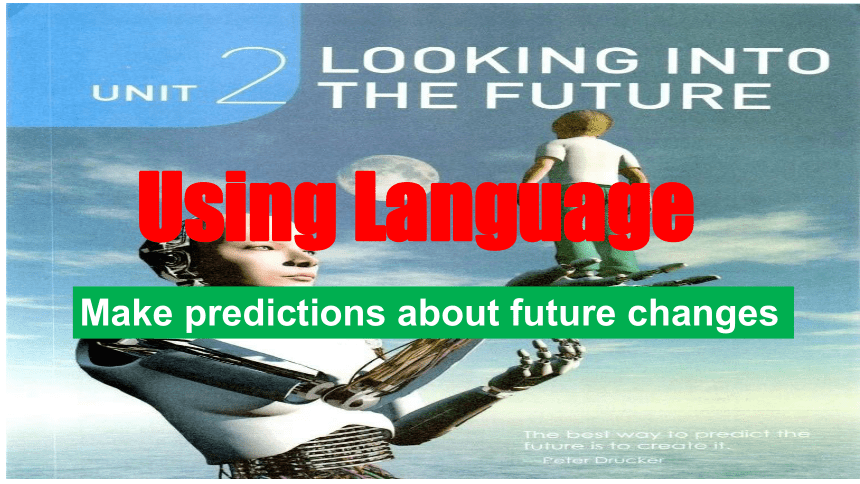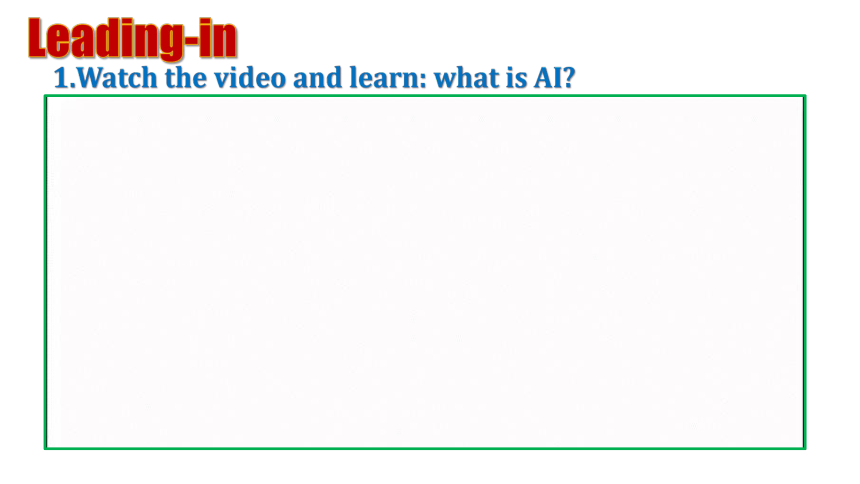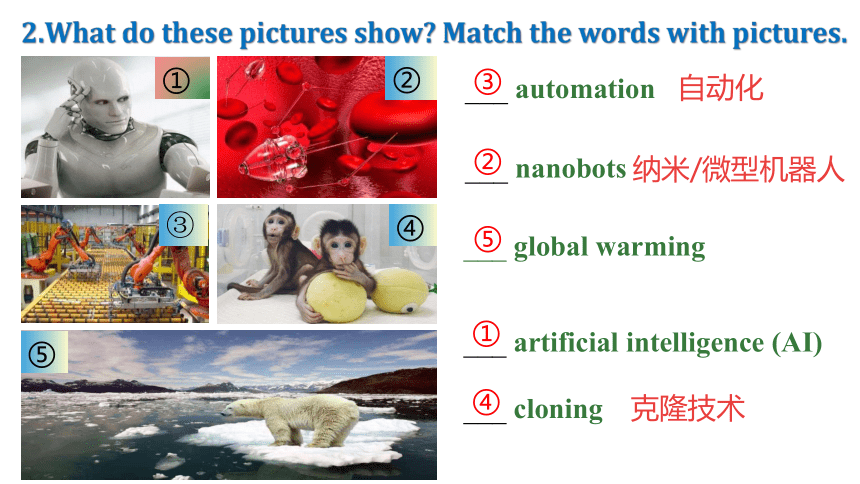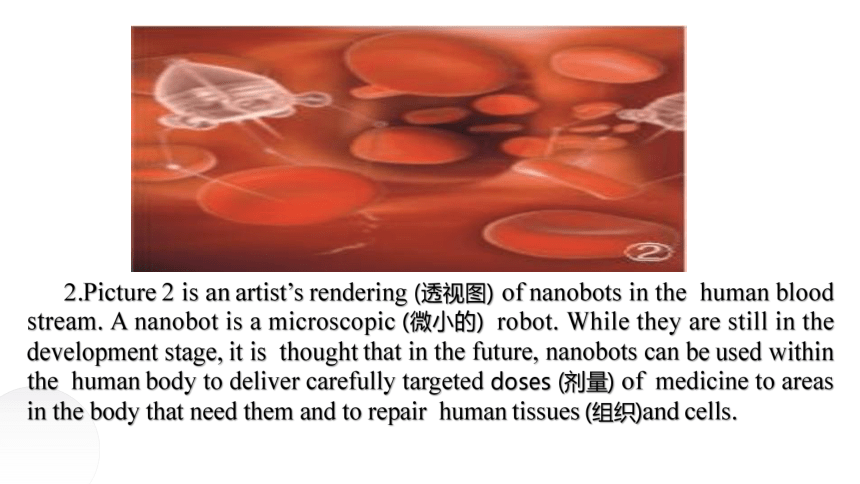人教版(2019)选择性必修第一册 Unit 2 Looking into the Future Listening and Speaking课件(15张PPT含视频和音频)
文档属性
| 名称 | 人教版(2019)选择性必修第一册 Unit 2 Looking into the Future Listening and Speaking课件(15张PPT含视频和音频) |  | |
| 格式 | pptx | ||
| 文件大小 | 12.3MB | ||
| 资源类型 | 教案 | ||
| 版本资源 | 人教版(2019) | ||
| 科目 | 英语 | ||
| 更新时间 | 2023-09-12 07:30:38 | ||
图片预览







文档简介
(共15张PPT)
Using Language
Make predictions about future changes
1.Watch the video and learn: what is AI
Leading-in
2.What do these pictures show Match the words with pictures.
___ automation
___ nanobots
___ global warming
___ artificial intelligence (AI)
___ cloning
②
③
④
⑤
③
②
⑤
①
④
①
自动化
纳米/微型机器人
克隆技术
1.While most often when people think of a robot, they think of the android (human-like robot) in Picture 1, actually the vast majority of robots are like that in Picture 3, which is a robot arm used to assemble (组装) parts in a factory. In this activity, the robot arm in Picture 3 represents automation. Since an android is meant to be like a human in every way, the android in Picture 1 is being used to represent artificial intelligence (AI).
③
①
3.Some cultural notes
2.Picture 2 is an artist’s rendering (透视图) of nanobots in the human blood stream. A nanobot is a microscopic (微小的) robot. While they are still in the development stage, it is thought that in the future, nanobots can be used within the human body to deliver carefully targeted doses (剂量) of medicine to areas in the body that need them and to repair human tissues (组织)and cells.
3.The two monkeys in Picture 4 are Zhong Zhong and Hua Hua, two crab-eating macaques(食蟹猕猴) which were produced by the Chinese Academy of Sciences(中国科学院) in Shanghai in 2017 through cloning. They were the first successfully cloned primates (灵长目动物).
Pre-listening
Listen for predictions
When listening for predictions, you should listen for the use of the future tense, in particular the future tense with will or will be doing. Words such as predict, prediction and forecast, are also used quite often when making predictions.
1.Listening Tips
2.How can we predict the future
1
Future events or problems the world would face
2
Future technologies or solutions
4
The challenges and opportunities the things might bring
3
How the things will change the way we live
1. What is Dr. Han’s occupation
A. professor B. musician
C. physician D. computer scientist
2. What is Dr. Han's attitude toward intelligent computers
A. worried and anxious B. skeptical
C. confident and optimistic D. critical
3. What is Vincent Black’s occupation
A. athlete B. engineer
C. architect D. fashion designer
4. What is Vincent Black’s prediction about
A. people of the future B. cities of the future
C. weather of the future D. food of the future
While - listening
1.Listen and choose the correct answer.
2.Listen to fill ,then check or complete the answers.
Listening target Dr Han’s prediction Vincent Black’s prediction
Future events/ problems
Future technologies /solutions
How things will change the way we live
Computers would be __________ than humans.
Robots will be programmed to not think in ways that may _______ humans.
Nanobots will be put inside our __________.
Our abilities will be _________.
The sea level will _______ by many metres.
Cities __________ on water will be built.
People don’t need to move away from the ___________.
cleverer
harm
bodies
increased
rise
floating
sea
Post-listening
1.Work in pairs. Discuss whether Dr Han or Vincent Black’s predictions are possible. Why or why not
Suggested Answers:
I agree on Dr. Han’s idea that computers will be cleverer than us in the future . Actually there are already computers, like AlphaGo, that are smarter than most people.
I don’t agree on Vincent Black’s idea that floating cities, because I doubt that sea levels will rise that much.
Speaking target Your prediction
Future events/ problems
Future technologies /solutions
How things will change the way we live
2.Imagine that you have a job that makes you an expert in the future. Make your own predictions!
3.In pairs, interview each other about your jobs and predictions. Learn to use the expressions.
Useful Expressions
I think/believe/predict that in the future
By 2030, we will…
I can imagine /forecast/predict …
One challenge will be…
We will be doing…
My prediction is that…
In the future, there will…
We will have the opportunity to…
We are going to ….
Sample Interview
A: Good afternoon, Ms. Zhang. Thank you for agreeing to do this interview.
B: I'd love to.
A: First,could you please tell our audience what you do
B: Certainly.I'm a doctor. I perform transplant surgery every week.
A: That sounds like a very high-tech job. How do you think the surgery will be operated in the future Do you have any predictions about that
B: Yes, well, I believe that doctors in the future will have much better means to help people. I can imagine that nanobots will be put in patients’ body to detect the illness. And in the future, there will be adequate supply of organs for patients who need transplant.
A: Well, that would be really good news for all of us. Could you please explain how this will be possible
B: Well,it will be possible because of special 3D printers. In the future, doctors will be using them in hospitals regularly to create healthy copies of people's organs. Then they will replace the unhealthy organs with the healthy copies.
2.Write a passage to describe your predictions about the future changes and post it online.
Homework
1.Recall the expressions for predictions.
Using Language
Make predictions about future changes
1.Watch the video and learn: what is AI
Leading-in
2.What do these pictures show Match the words with pictures.
___ automation
___ nanobots
___ global warming
___ artificial intelligence (AI)
___ cloning
②
③
④
⑤
③
②
⑤
①
④
①
自动化
纳米/微型机器人
克隆技术
1.While most often when people think of a robot, they think of the android (human-like robot) in Picture 1, actually the vast majority of robots are like that in Picture 3, which is a robot arm used to assemble (组装) parts in a factory. In this activity, the robot arm in Picture 3 represents automation. Since an android is meant to be like a human in every way, the android in Picture 1 is being used to represent artificial intelligence (AI).
③
①
3.Some cultural notes
2.Picture 2 is an artist’s rendering (透视图) of nanobots in the human blood stream. A nanobot is a microscopic (微小的) robot. While they are still in the development stage, it is thought that in the future, nanobots can be used within the human body to deliver carefully targeted doses (剂量) of medicine to areas in the body that need them and to repair human tissues (组织)and cells.
3.The two monkeys in Picture 4 are Zhong Zhong and Hua Hua, two crab-eating macaques(食蟹猕猴) which were produced by the Chinese Academy of Sciences(中国科学院) in Shanghai in 2017 through cloning. They were the first successfully cloned primates (灵长目动物).
Pre-listening
Listen for predictions
When listening for predictions, you should listen for the use of the future tense, in particular the future tense with will or will be doing. Words such as predict, prediction and forecast, are also used quite often when making predictions.
1.Listening Tips
2.How can we predict the future
1
Future events or problems the world would face
2
Future technologies or solutions
4
The challenges and opportunities the things might bring
3
How the things will change the way we live
1. What is Dr. Han’s occupation
A. professor B. musician
C. physician D. computer scientist
2. What is Dr. Han's attitude toward intelligent computers
A. worried and anxious B. skeptical
C. confident and optimistic D. critical
3. What is Vincent Black’s occupation
A. athlete B. engineer
C. architect D. fashion designer
4. What is Vincent Black’s prediction about
A. people of the future B. cities of the future
C. weather of the future D. food of the future
While - listening
1.Listen and choose the correct answer.
2.Listen to fill ,then check or complete the answers.
Listening target Dr Han’s prediction Vincent Black’s prediction
Future events/ problems
Future technologies /solutions
How things will change the way we live
Computers would be __________ than humans.
Robots will be programmed to not think in ways that may _______ humans.
Nanobots will be put inside our __________.
Our abilities will be _________.
The sea level will _______ by many metres.
Cities __________ on water will be built.
People don’t need to move away from the ___________.
cleverer
harm
bodies
increased
rise
floating
sea
Post-listening
1.Work in pairs. Discuss whether Dr Han or Vincent Black’s predictions are possible. Why or why not
Suggested Answers:
I agree on Dr. Han’s idea that computers will be cleverer than us in the future . Actually there are already computers, like AlphaGo, that are smarter than most people.
I don’t agree on Vincent Black’s idea that floating cities, because I doubt that sea levels will rise that much.
Speaking target Your prediction
Future events/ problems
Future technologies /solutions
How things will change the way we live
2.Imagine that you have a job that makes you an expert in the future. Make your own predictions!
3.In pairs, interview each other about your jobs and predictions. Learn to use the expressions.
Useful Expressions
I think/believe/predict that in the future
By 2030, we will…
I can imagine /forecast/predict …
One challenge will be…
We will be doing…
My prediction is that…
In the future, there will…
We will have the opportunity to…
We are going to ….
Sample Interview
A: Good afternoon, Ms. Zhang. Thank you for agreeing to do this interview.
B: I'd love to.
A: First,could you please tell our audience what you do
B: Certainly.I'm a doctor. I perform transplant surgery every week.
A: That sounds like a very high-tech job. How do you think the surgery will be operated in the future Do you have any predictions about that
B: Yes, well, I believe that doctors in the future will have much better means to help people. I can imagine that nanobots will be put in patients’ body to detect the illness. And in the future, there will be adequate supply of organs for patients who need transplant.
A: Well, that would be really good news for all of us. Could you please explain how this will be possible
B: Well,it will be possible because of special 3D printers. In the future, doctors will be using them in hospitals regularly to create healthy copies of people's organs. Then they will replace the unhealthy organs with the healthy copies.
2.Write a passage to describe your predictions about the future changes and post it online.
Homework
1.Recall the expressions for predictions.
